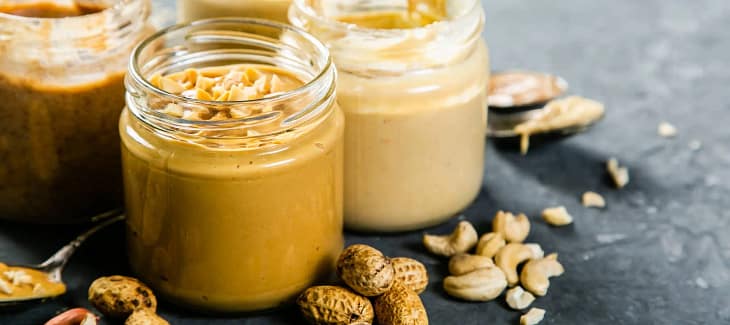Believe it or not, peanut butter is far from the only way to make your sandwich go great with jelly! Nut butters, all made from condensed, mashed fatty nuts, are some of the most versatile foods on the planet. They can be eaten alone or mixed with other foods at any time of the day, most popularly as a filling lunch snack.
Nut butters add healthy flavor and calories to sandwiches, cookies, oatmeal, pancakes, waffles, smoothies, protein shakes, and more. Each nut butter is delicious and unique in their own way. In this article, I will give you the nutrition information of the eight most popular nut butters and highlight the most unique qualities each one has.
All nutrition information is based on 1 tablespoon of the nut butter. 1 tablespoon can hold around 16 grams of nut butter. Please keep in mind that the nut butters included in this list are not numbered in any particular order.
1. Peanut butter
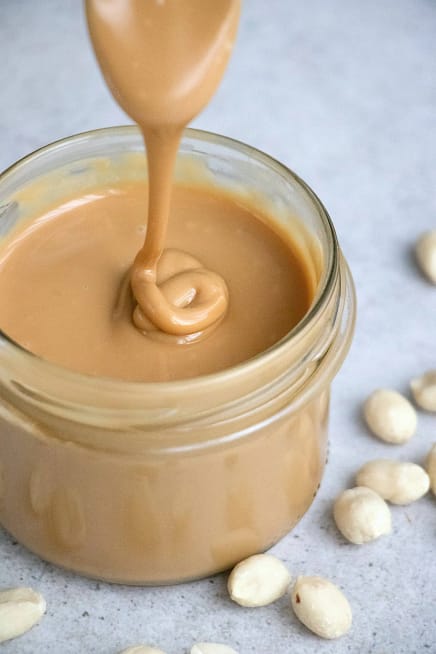
Calories: 94 kcal
Fat: 8.1g total fat, 1.6g saturated fat
Protein: 4g
Peanut butter is the most popular nut butter in the United States. It is packed with vitamins, healthy fats, protein, and antioxidants. It is a very common sight on grocery store shelves and is great to eat for anyone who does not suffer from a peanut allergy.
Peanut butter’s affordability and long shelf life are two of its strongest attributes in everyday use. Being able to easily purchase and consume cheap, high-quality plant protein practically anywhere gives peanut butter an awesome reputation. Few foods can match what peanut butter gives in nutrition while still being budget-friendly. Additionally, peanut butter is great to store with other pantry foods, since it typically has a shelf life of two to three months after opening the jar. One to two months of shelf life is typically universal across all nut butters.
If you want the best quality and nutrition, choose organic, low sugar peanut butter brands. That way, you can be confident that the peanut butter you buy will be healthy for you. Thanks to peanut butter’s popularity, there are countless peanut butter companies and producers. Many of them insert additives and added sugars in their peanut butters, which can be unhealthy for you and upset your stomach.
Not only that, but many commercial brands also include hydrogenated vegetable oil, which makes peanut butter taste more pleasant by stabilizing the natural oils. If you see any peanut butter jar that has the oil naturally separated and floating at the top of the jar, it is likely healthier for you. Hydrogenated oil mixes well with peanut butter, but can be very negative for your cholesterol levels. Avoid hydrogenated oils if you want healthier peanut butter, but keep in mind that some peanut butters with palm oil may still be good options to choose.
Peanut butter has high protein like pistachio butter. It also has a good amount of fiber, which makes it perfect for bodybuilders and those looking to lose weight. Peanut butter is also known to be a heart-healthy food since it contains omega-3 fatty acids and oleic acid. Both fats are known to be correlated with healthier blood glucose levels and better cholesterol. The nut butter is also a good source of copper, manganese, Vitamin B3, iron, folate, and potassium.
2. Almond butter
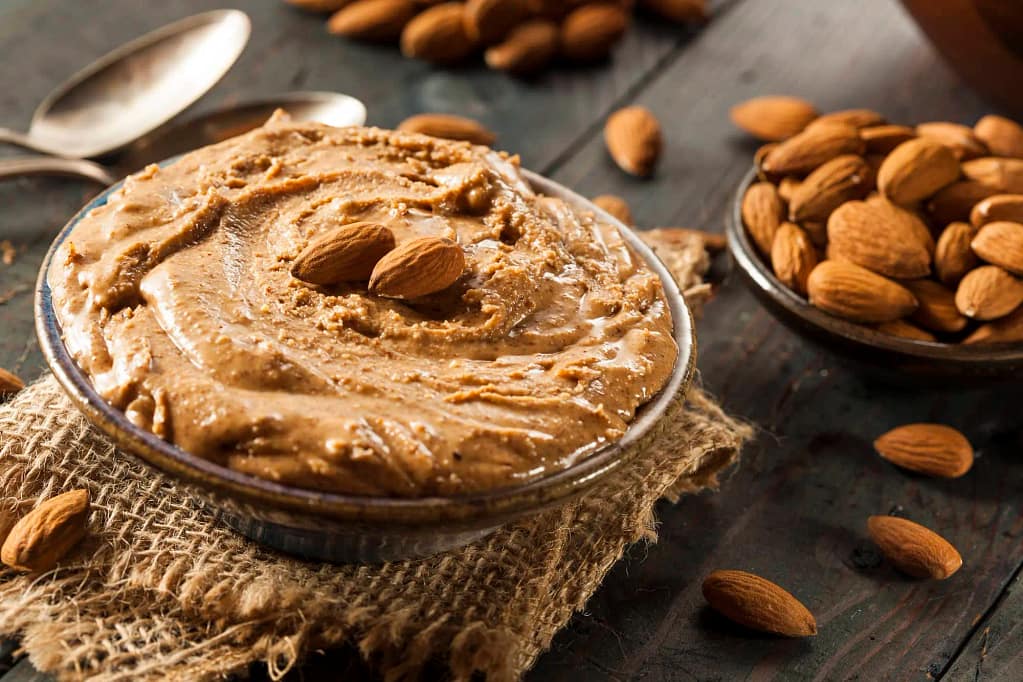
Calories: 101 kcal
Fat: 9.5g total fat, 1g saturated fat
Protein: 2.4g
Almond butter is a great gluten-free nut butter, and one of the most popular. It contains more calories and unsaturated fats than most other nut butters. Stay away from almond butter if you have an allergic reaction to almonds. It goes great with crackers, fruit slices, and sandwiches.
Almond butter may be the best nut butter for healthy fat consumption. It contains approximately 25% more monounsaturated fat than peanut butter per serving, and has more fiber and essential vitamins. Almond butter beats peanut butter in its vitamin E, iron, and calcium content. Vitamin E in particular is very abundant in almond butter which helps maintain good arterial health and stable bone formation. If you want the ultimate heart-healthy nut butter, look no further than almond butter.
However, almond butter is very expensive to buy, especially organic brands. This issue alone turns away most people from the nut butter, but it is possible to make almond butter yourself. You can simply throw together almonds and salt in a food processor and create it that way, which may be a cheaper way to produce your own almond butter.
Many amazing recipes, especially baking recipes, use almond butter as a base. It’s high unsaturated fat content and smooth consistency usually makes it more reliable than peanut butter. Almond butter is popular to use in overnight oats recipes, such as this one that utilizes both almond butter and dark chocolate.
3. Cashew butter
Calories: 94 kcal
Fat: 7.9g total fat, 1.6g saturated fat
Protein: 2.8g
Cashew butter is unique amongst other nut butters for its creaminess, richness, and nutty flavor. Foods spread with this nut butter taste delicious and almost like a hummus. It is very filling and satisfying thanks to its high calorie count and richness.
Cashew butter is the best nut butter for natural cholesterol reduction, since cashews themselves already excel at this. Additionally, cashew butter aids eye health, is naturally sodium-free, and contains a balanced amount of fibers, protein, and fats.
If you suffer from a peanut allergy, it is ok to have cashew butter since peanut allergies and tree nut allergies are separate from each other. However, it is still important to check the nutrition label of cashew butter and see if it was produced in a factory that also produces peanuts. This is important for preventing cross-contamination.
4. Walnut butter
Calories: 104 kcal
Fat: 10g total fat, 1g saturated fat
Protein: 2.5g
Walnut butter is a rather rare nut butter to come across, but its health benefits are not to be underestimated. Like the other nut butters, walnut butter contains plenty of vitamins, minerals, healthy fats, and antioxidants. It is a tree nut butter which, when consumed, can ward off obesity and cancer with their hormone-balancing compounds and anti-inflammatory vitamins.
Walnut butter’s great strength lies in its high amount of naturally occurring L-arginine. It is an amino acid which helps with blood flow and muscle strength. L-arginine also has anti-aging properties, which makes it highly sought after in the health and beauty industry. Consuming walnut butter in moderate, reasonable amounts per day can help your skin and immune system feel refreshed. It pairs well with omega-3 fatty acids to support brain, skin, and muscle development as well. Walnut butter is great to eat straight out of the jar, and it is also found in lotions, creams, and soaps.
5. Pecan butter
Calories: 107 kcal
Fat: 10g total fat, 1g saturated fat
Protein: 2g
Pecan butter is wetter than most butters, but still manages to taste rich and creamy. It has around 20 unique vitamins and minerals, including magnesium and potassium, and has great fiber. However, it should be consumed in moderation because its fat content is very high.
Pecan butter is an antioxidant powerhouse. It contains vitamin E, carotenoids and ellagic acid. All of these nutrients are great for preventing cancers, infections, and degenerative diseases like Alzheimer’s and Parkinson’s disease. Pecan butter is good at maintaining optimal heart health and healthy cholesterol levels. Finally, it has a flavor that is slightly sweet and rich, with a bit of roasted undertones.
6. Hazelnut butter (Nutella-like)
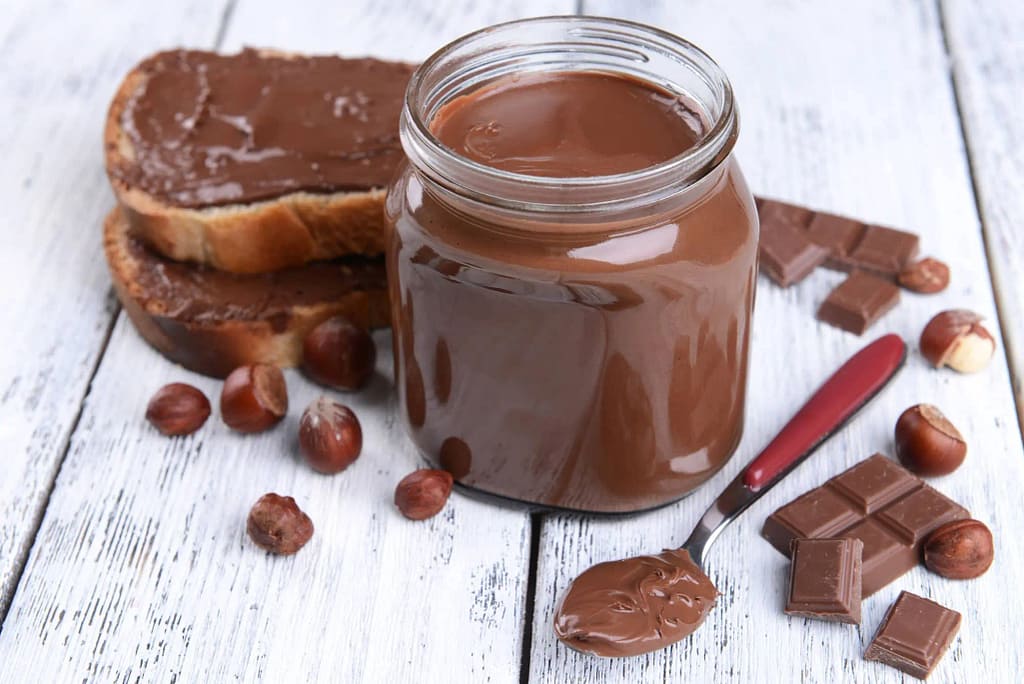
Calories: 90 kcal
Fat: 8.5g total fat, 0.5g saturated fat
Protein: 2g
Likely the most unique of all the nut butters, hazelnut butter is infamously mixed with cocoa to create Nutella, the ultimate spreadable chocolate dessert. Even without cocoa infused into the butter, it still tastes like a sweet dessert, and pairs nicely with many baking and dessert recipes. Raw hazelnut butter is healthier for you than Nutella and can easily be found in most grocery stores near other nut butters.
Hazelnut butter’s nutrition is similar to other nut butters. It contains proteins, healthy fats, and vitamins such as vitamins B and E. Specifically, it is a great source of potassium, calcium, and magnesium. All of these nutrients are great for maintaining healthy bones, skin, and energy metabolism. It is also great for eye health like cashew butter and pistachio butter. Try hazelnut butter if you are looking to satisfy your sweet tooth!
7. Macadamia butter
Calories: 115 kcal
Fat: 12g total fat, 2g saturated fat
Protein: 1g
Macadamia nut butter contains the highest amount of calories per tablespoon, which makes it unappealing to consume in large quantities, but great if you’re looking for a hunger-reducing snack. It has an extremely high fat content compared to the other nut butters as well. These fatty acids are more than 75% monounsaturated, so this nut butter is among the best for heart health and skin health. It is comparatively better than almond butter for healthy fat consumption, but its high calorie count can be discouraging to some.
It also contains an enormous amount of manganese and vitamin B1. Manganese helps the body fight off infections and disease by supplementing connective tissue, red blood cell, and sex hormone formation. Vitamin B1 promotes nervous system health and muscle function. With that in mind, macadamia butter more than holds its own when it comes to vital nutrition benefits.
Macadamia butter unfortunately has a poor amount of protein compared to other nut butters. This makes it underwhelming for muscle growth and weight loss, so the other nut butters are better to have for this purpose. Still, it is a tasty and heathy nut butter to have in moderation.
8. Pistachio butter
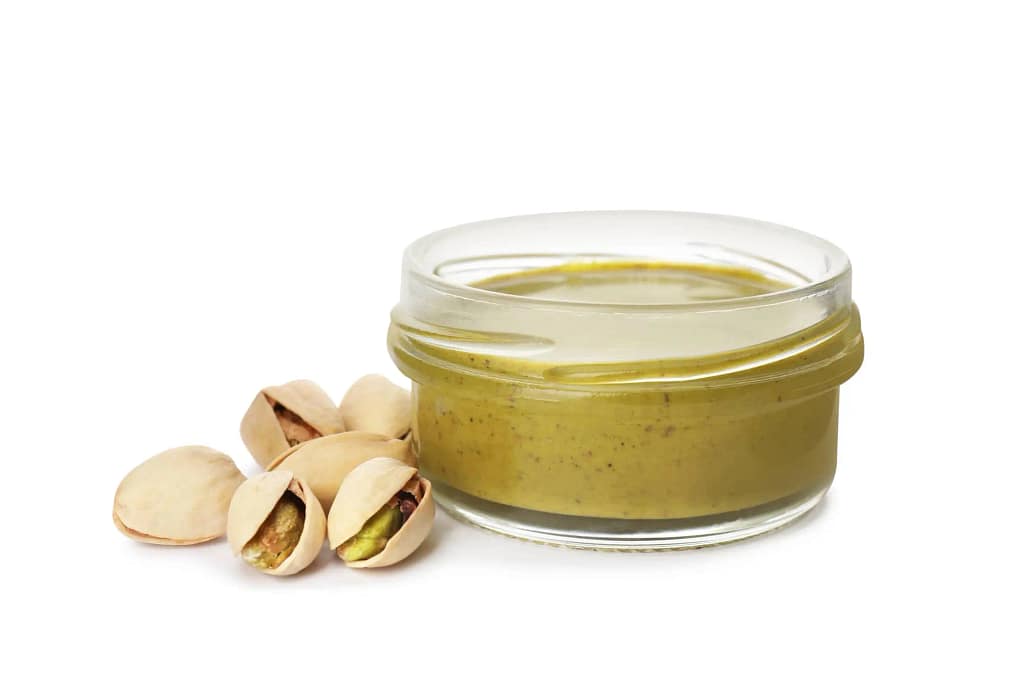
Calories: 90 kcal
Fat: 7g total fat, 1g saturated fat
Protein: 4g
This is the ultimate superfood nut butter! Pistachio butter is green and feels quite thick in texture. The flavor is rich and intense. It rivals peanut butter in terms of protein and is jam-packed with nutrients. It is the only nut butter on the list that has less calories and fat per tablespoon than average.
Pistachio butter is lower in calories than other nut butters, which is great if you’re running a low-calorie diet. It also has a higher quantity of branched chain amino acids (BCAAs) than all other nut butters, making it great for bodybuilders who need to target specific amino acids for growth. On top of its already high protein count, this makes pistachio butter viable in any muscle-building diet. The butter can be spread on healthy snacks like cheese or beef jerky, or mixed with protein powder in a blender to add some extra protein.
Pistachio butter has more vitamin A than most other nut butters, meaning it’s great for eye health. Compared to peanut butter, pistachio butter contains more vitamin B6, calcium, iron, phosphorus, and potassium, but has less zinc, niacin, sodium, and saturated fats. This amazing nut butter can be thought of as a rarer but stronger peanut butter, since they share many of the same nutrients.
Depending on where you live, pistachio butter may be difficult to find. You usually won’t find it in conventional grocery stores, and you may have to purchase it online or at a food chain that only serves natural and organic food, like Whole Foods. Pistachio butter may just be the most nutrient-dense of all the nut butters.
Conclusion
To be fair, there is no nut butter that is better than another, since they all possess various properties that make them unique. While peanut butter and almond butter tend to be the most common of these eight nut butters, all of them have important uses in the kitchen. What’s most important is to choose the nut butters that fit perfectly in your diet and your budget!

